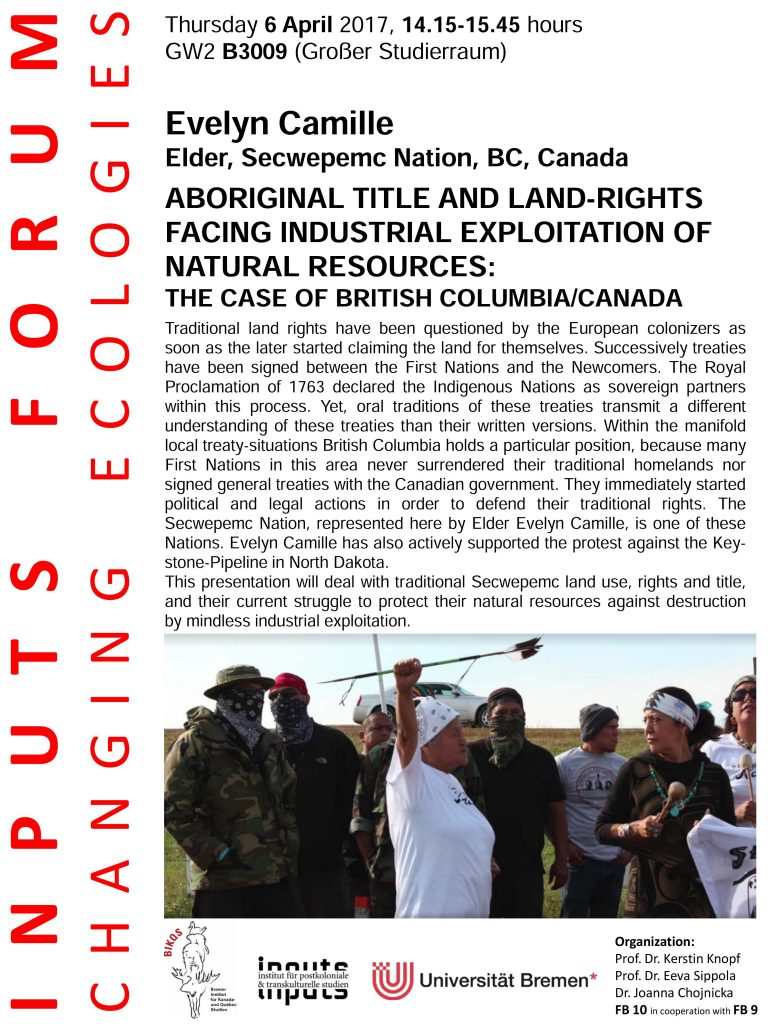Reminder: The CfP for our 39th Annual Conference is still open until May 29, 2017!
39th Annual Conference of the Association for Canadian Studies in German-speaking Countries (GKS), February 16 – 18, 2018, Hotel am Badersee, Grainau, Germany
The Association for Canadian Studies in German-speaking Countries aims to increase and disseminate a scholarly understanding of Canada. Its work is facilitated primarily through seven disciplinary sections, but it is decidedly multidisciplinary in outlook and seeks to explore avenues and topics of, and through transdisciplinary exchange. For its 2018 annual conference, the Association thus invites papers from any discipline that speak to the conference theme of „GeschichteN – HiStories – HistoireS“ with a Canadian or comparative focus. (Papers can be presented in English, French or German.) We are particularly – but not exclusively – interested in the following aspects:
Writing History and writing stories are as closely intertwined as telling about the past and storytelling. Histories try to reconstruct the past in a narrative form, and stories are hardly conceivable without references to the past or to various pasts. Both construct and contain narratives and with them social, cultural, ideological, and physical landscapes. Narratives tell us of people(s) and their interaction, with each other as well as with the physical and social environment they live in. And narrative constructions form a basis of any kind of scholarship.
At the annual meeting of the Canadian Studies Association, we will explore differences, similarities, and interdependencies of narratives, stories and histories along these topics:
1) Are Canadian (Hi)Stories different?
Is Canadian history and writing about Canadian issues significantly different from that of other nations? Do Canadian authors, scholars, journalists and historians have different voices, are they voicing difference? How has the story of two “founding nations” and the fact that French Canada (and then Quebec) has developed its own national historiography influenced the writing of histories? How have Aboriginal oral and printed historical narratives influenced the perception of Canadian history? Are Canadian authors, scholars, journalists and historians looking beyond the arbitrary boundaries of the nation state or boundaries such as class, gender, and race? What are the narratives and ideas of the Canadian self, what is the nature of assumptions, (self-)images, narratives, maps, plans, documents and texts that construct Canada?
2) Authenticity, Historical “Truth” and beyond
How “authentic” can Canadian histories, stories of and about Canada be, how subjective need they to be? How do historians, scholars and other authors deal with multiperspectivity, contested and alternative histories, heterogeneous and plural forms of history? How do they deal with historiographic metafiction?
What is the relationship between “truth“ and “alternative“ facts in Canadian history, science, politics, media etc.? How do scholars and authors reflect upon the selection of their topics, their sources, their medium of expression, their own subjectivity and the goals they try to achieve?
3) Voices not Heard
Do Canadian historians, scholars, journalists and authors “lend their pen” to voices of those not heard and marginalized, of peoples that have no written record of their past, and possibly rely on transmediation? By what mechanisms are certain peoples and societal groups excluded and how do they gain a voice? How have these peoples and groups “taken the pen” and started “writing back”? And what role do alternative historical, cultural, societal, political, geographical, economic and literary discourses play?
4) Inscribing (Hi)stories – Authorship, Memories, City- and Landscapes
Do historians, scholars and authors and their narratives matter, and if so, how and for whom? How important are the specific medium (print, radio/television, internet, art etc.) and the genre (oral traditions, auto-/biographies, speculative fiction, historiographic metafiction etc.) they use for the narratives chosen? What are the (hi)stories that shape Canadian landscapes, cityscapes, cultural memories and public spaces? And how are these (hi)stories inscribed in images, maps, social and institutional structures, landscapes and environments of Canada?
Confirmed keynote speakers are:
Franca Iacovetta (University of Toronto)
Andrée Lévesque (Archives Passe-Mémoires, Montreal History Group – McGill University)
Glen Coulthard (University of British Columbia)
Contact and abstract submission
Paper proposals/abstracts of max 500 words should outline:
– methodology and theoretical approaches chosen,
– content/body of research
– which of the four main aspects outlined above the paper speaks to (if any).
In addition, some short biographical information (max. 250 words) should be provided, specifying current institutional affiliation and position as well as research background with regard to the conference topic and/or four main aspects.
Abstracts should be submitted no later than May 29, 2017 to the GKS Administration Office (gks@kanada-studien.de).

